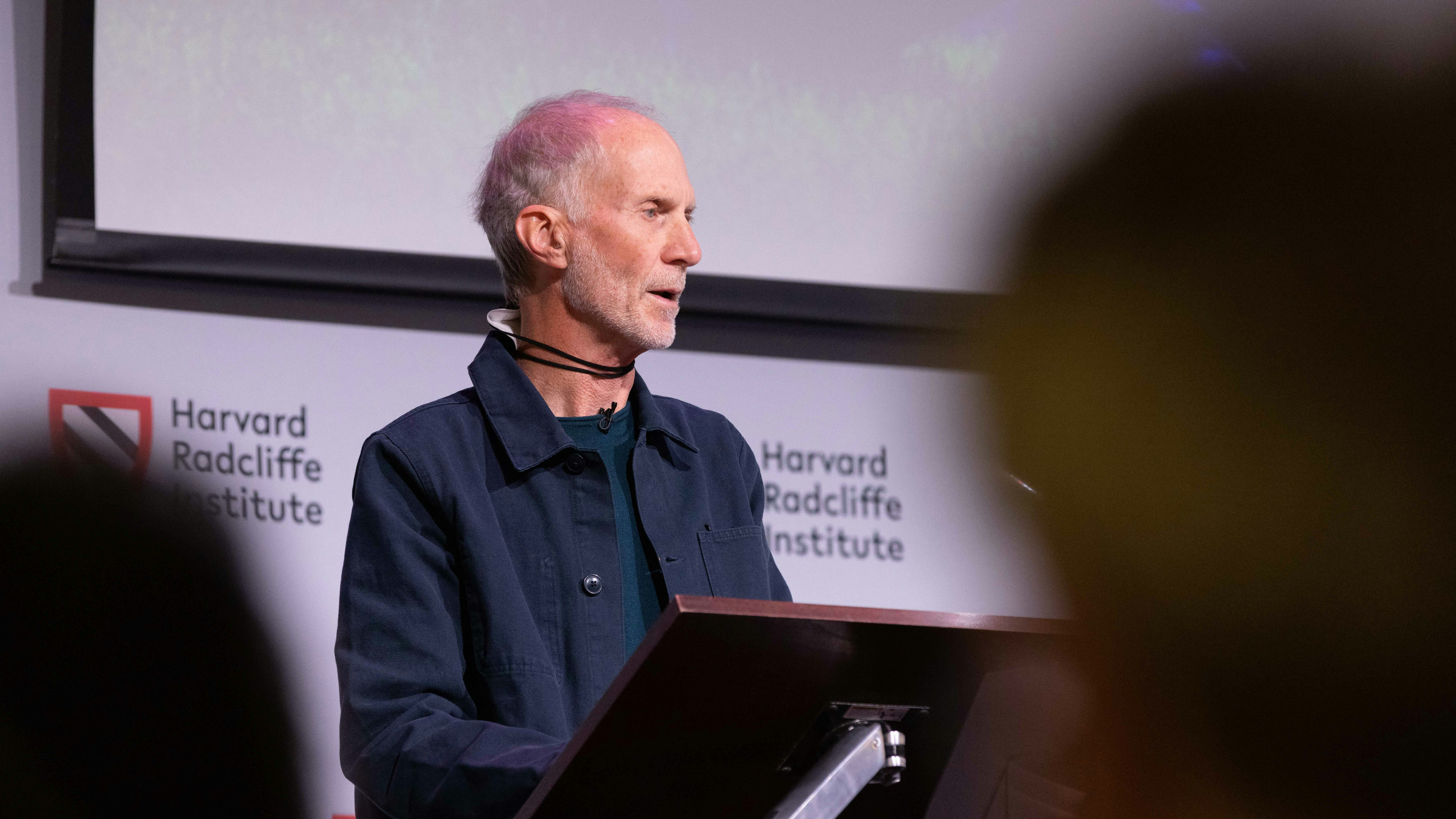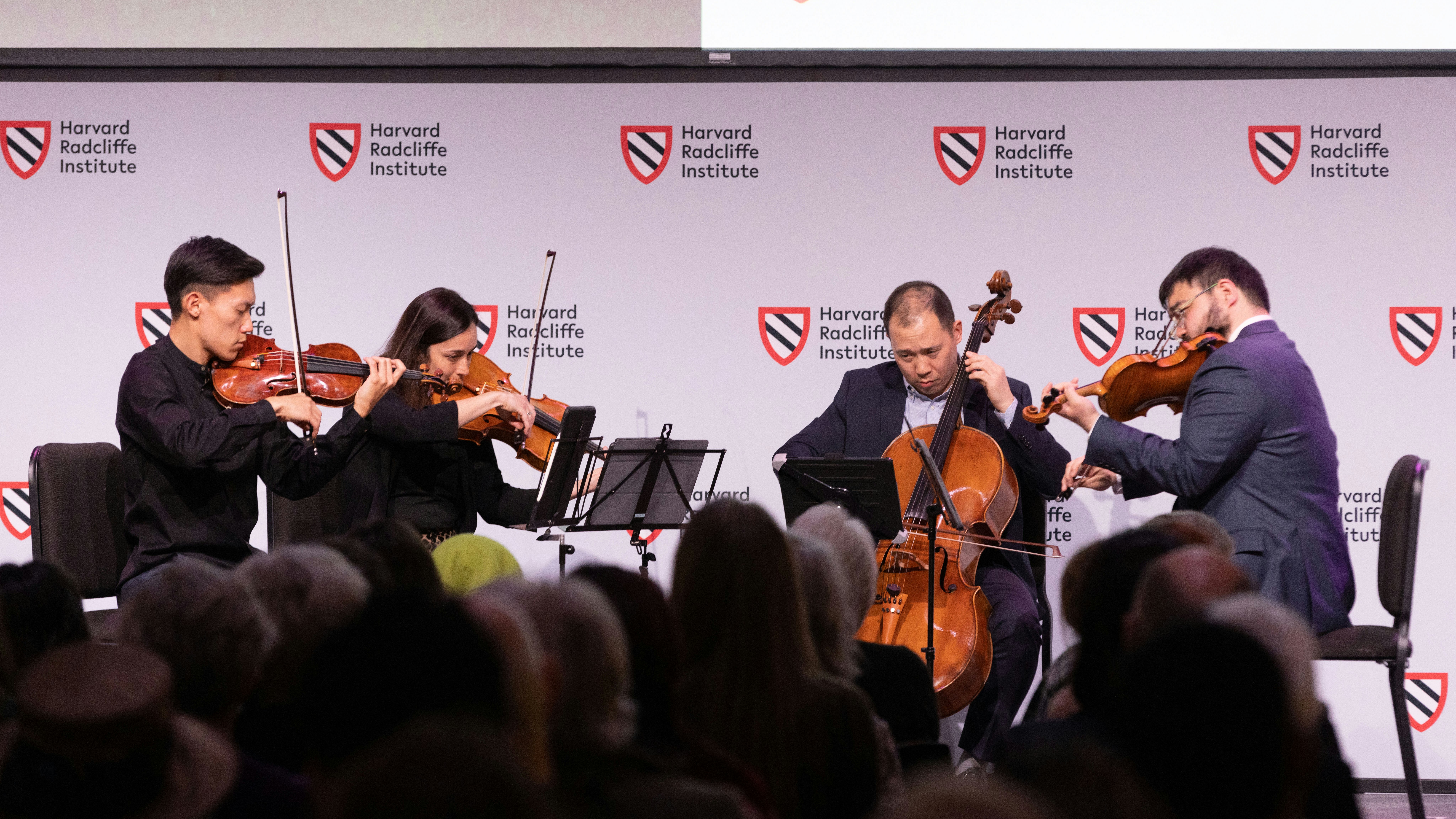Can Music Save a Burning World?

John Luther Adams’s music implores us to consider the effect of the Anthropocene on the natural world—but don’t call it a requiem.
John Luther Adams, the lauded American composer and environmental activist whose music subtly asks us to wake up and come home (save Earth!), arrived at Harvard Radcliffe Institute on a sun-soaked Tuesday to have lunch outside with 25 coolly starstruck Harvard undergraduate and graduate students.
The 70-year-old is having a moment, arriving here from New York, where the Philadelphia Orchestra played his new, 50-minute work, Vespers of the Blessed Earth, at Carnegie Hall. The world premiere was in Philadelphia the night before—and Adams had taken Amtrak the entire trip from his mountain home in southern New Mexico to cut back on his carbon footprint.
What role classical music can play in a post-COVID, inclusive yet divided, precariously warming and storming world may be in question, especially after Apple recently moved its classical music collection to a separate app. But not on Radcliffe’s greening lawn this week.
Adams and the students spoke together about the power and art of listening, and about how music can impel us to think and pause. Autographs were signed and pictures posted.

The Parker Quartet plays Adams's "The Wind in High Places." Photo by Evgenia Eliseeva
The ability of music to create change was also apparent during a packed Kim and Judy Davis Dean’s Lecture in the Arts that same day, with the renowned Parker Quartet playing sublime pieces of Adams’s work alongside the composer reading personal essays from his forthcoming book, “Down the Mountain.”
“I think his music invites audiences to ask questions about art’s relationship to the natural world which are kind of uncomfortable or maybe seem unnecessary to think about,” said Leo Sarbanes, a third-year Harvard doctoral student in historical musicology. “I think he’s drawing on sort of the romantic tradition of using music to romanticize nature’s beauty but then channeling a much broader set of concerns about how we’re relating to the world now in the Anthropocene.”
In a discussion after the performances, Jeremy Eichler—the Boston Globe chief classical music critic who was a 2016–2017 fellow at Harvard Radcliffe Institute—told Adams his music makes him think about the myth of duality between humans and the natural world.
In Vespers of the Blessed Earth, singers intone a litany of endangered plants and animals, ending with a song to the human.
Eichler asked Adams whether his new piece was a requiem. No, said Adams. Calling it a requiem would let people off the hook. “These are prayers,” he said.
He noted throughout his talks with the students and the audience that he does not want his work to be seen as a form of environmental activism. Instead, he wants any activism to come through the aesthetic of his music. But he acknowledged that, while his older pieces are largely ascending musically, his latest works are all on a swift descent. “I’m just trying to hear something I haven’t heard before and to discover a place that maybe we haven’t been before,” he said.
“For years, I’ve insisted on the separation of church and state,” he said. “The music and activism have to be separate,” a decision he said he made as a young composer in his 30s. “But perhaps me doth protest too much.”
But “titles, essays, program notes, interviews, conversations, blah blah blah. All of that means absolutely nothing unless the music touches you in some way…. It’s just moot,” he said. “I’m trying to walk that razor’s edge of being true to my art but also being a citizen of the earth.”
Cana McGhee, a fourth-year doctorate student studying historical musicology, said she is “deeply hopeful in the power of music and sound to be able to make us listen to the world differently.”
“Listening is a very sensitive, embodied thing that we do,” she said. “So listening to anything that’s encouraging us to be critical of our world, I think, is important. [The year] 2020 is a big touchstone for how all kinds of institutions have been structured in ways that make that kind of change less possible, but I think things are changing now, more than we’ve seen before.”
Classical music, she said, is becoming more inclusive, “so that more people can be exposed to different kinds of experiences as they occur in music.” A friend reminded her that after Taylor Swift heard Adams’s Pulitzer Prize-winning Become Ocean in 2015, she pledged $50,000 to the Seattle Symphony.
“Powerful forces in our society have invested a lot in classical music, often at the expense of other kinds of music,” said Sarbanes. “But the result of that is that we have a continuous kind of centuries-long tradition at our disposal to speak across time. And work that engages environmental issues, like John’s does, I think is activating that dialogue in a really rich and deeply felt way.”







